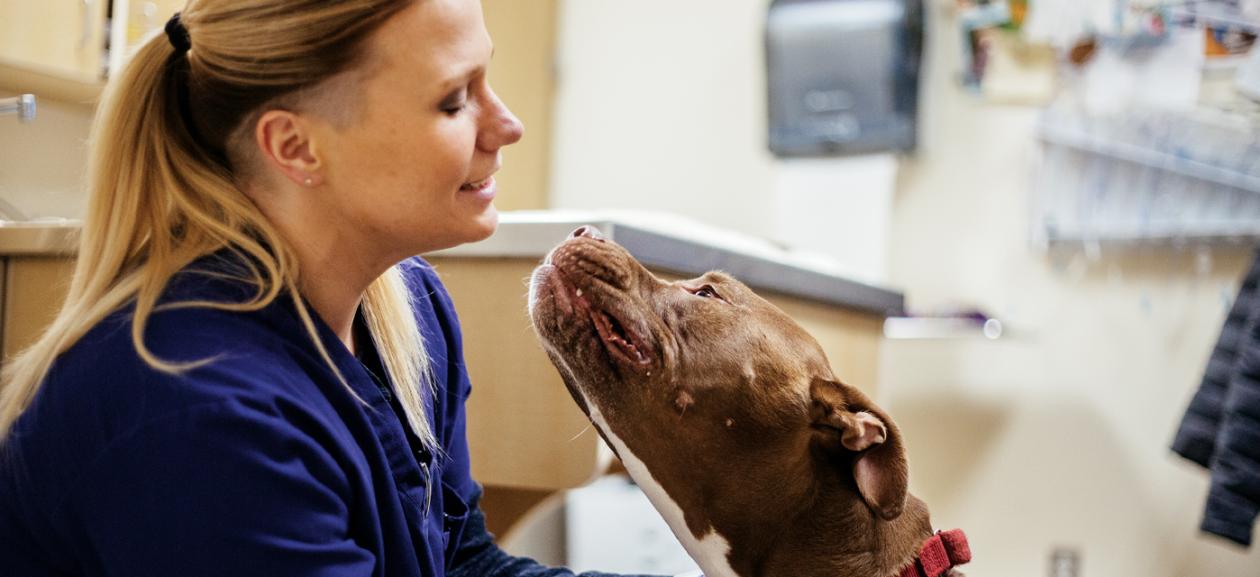
Keeping Your Pet's Heart Healthy for American Heart Month
PORTLAND, Ore. – In honor of American Heart Month, DoveLewis is encouraging pet owners to care for their animal’s heart health by knowing the signs of heart disease and focusing on prevention.
Nearly 10 percent of dogs and cats suffer from heart disease. Like humans, animals experience different types of heart disease – those that are genetic or age related, and those that develop as a result of other health issues. While many genetic or age-related occurrences cannot be prevented, animals can live long, happy lives through early detection, a healthy lifestyle and monitored disease management.
Otherwise, many forms of heart disease are preventable through proactive healthy lifestyle choices. These tips from DoveLewis cardiologist Dr. Caryn Reynolds can help keep a pet’s heart healthy.
BALANCED DIET
Feeding your pet a balanced diet to maintain a healthy weight is the best way to prevent heart disease. Dogs and cats should eat a meat-based diet that is recommended by their veterinarian. For optimal heart health, Dr. Reynolds suggests avoiding a raw food diet. “Raw meat is more likely to contain bacteria that can get into a dog’s blood stream and cause heart valve infection,” she said.
A cat’s diet must also include taurine, a necessary building block of amino acids that cats do not produce on their own. That means avoiding grain-only diets, as taurine is found only meat-based foods.
EXERCISE
For all of us – humans and pets – regular exercise is important for a healthy heart. Though specific exercise needs are based on your pet’s breed, size and age, every animal needs some form of daily activity. At minimum, most healthy dogs should get at least 30 minutes of brisk physical activity every day. Hunting or working breeds (like Labrador retrievers and hounds) may require an additional one to two hours of activity. Consult your veterinarian to determine the exact amount and type of daily activity required for your dog.
Cats should spend at least 15 minutes each day engaging in physical activity. As most cat owners know, it may require some imagination and a bit of trial and error to discover what activity your cat prefers. If your feline doesn’t have the endurance or interest to play for the full 15 minutes, start with a few minutes of play multiple times a day.
HEARTWORM AND PARASITE PREVENTION
Regular heartworm prevention for dogs – often monthly (or according to medication instructions) – is crucial to avoid severe medical issues that can result from heartworms. The American Heartworm Society also recommends that dogs get a heartworm blood test every two to three years (and more often if they don’t regularly receive prevention medication).
Other parasites, like fleas and ticks, can also carry infectious agents that can affect an animal’s heart. Preventing these parasites can be necessary year-round in Oregon, where the weather is often be mild, creating an extended living environment for the creatures.
REGULAR CHECK-UPS
When it comes to heart disease, early detection is vital to managing the disease and prolonging a pet’s life. “Through a physical exam with your regular veterinarian, many heart problems can be detected before symptoms arise,” said Dr. Reynolds. DoveLewis recommends a yearly wellness exam for all pets – more often if necessary based on health issues.
Symptoms for heart disease include:
- Difficulty breathing
- For cats, open-mouth breathing or panting
- Weakness or fatigue
- Coughing
- Loss of appetite
- Rapid weight loss
- Rapid or very slow heartbeat
If your pet experiences any of these symptoms, visit your veterinarian or DoveLewis immediately.
Recent Posts
Holiday Hazards for Your Pet
Deck the halls with boughs of holly … but be sure it’s out of reach of your furry friends! It’s easy to get swept up in the festivities of the season, but don’t forget that added fun means added risks for your pets.
Top Winter Care Tips for Your Pets
When you normally think of weather safety with your pets, you may naturally think of leaving animals in hot cars during summer. But did you know that cold weather also poses a serious threat to your animal's wellbeing?



